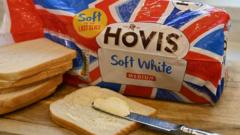Will Kingsmill's Owner Create a UK Bread Giant by Acquiring Hovis?

Understanding the Merger of Kingsmill and Hovis: What It Means for the UK Bread Market
The recent announcement that Associated British Foods (ABF) plans to acquire Hovis and merge it with Kingsmill has sent ripples through the UK bread market. As the owner of well-known brands like Primark, Ryvita, and Twinings, ABF aims to create the largest bread brand in the UK. However, this move comes amid rising consumer preferences for specialty breads and a declining demand for traditional loaf varieties. In this article, we will explore the implications of this merger, the current state of the bread market, and what it means for consumers, employees, and stakeholders involved.
The Current Landscape of the UK Bread Market
The UK bread market has been evolving rapidly in recent years. Traditional pre-packaged bread sales, such as those produced by Kingsmill and Hovis, have stagnated. Consumers are increasingly gravitating towards artisanal and specialty breads, including sourdough and ciabatta. This shift in consumer behavior is influencing the strategies of major players in the industry.
Several factors contribute to this evolving landscape:
- Health Consciousness: Many consumers are adopting low-carb diets, which has impacted the demand for traditional bread products. This trend has led to a decrease in bread consumption overall.
- Variety and Innovation: There is a growing desire for diverse options, prompting brands to innovate with healthier ingredients and unique flavors.
- Convenience: With busy lifestyles, consumers are looking for quick meal solutions, which has led to the popularity of items like wraps and sandwich alternatives.
The Merger: Details and Strategic Goals
ABF has expressed optimism about the merger, suggesting that the combined entity of Kingsmill and Hovis will be better positioned to compete in a challenging market. The company aims to achieve cost synergies and efficiencies that could lead to a more sustainable and profitable business model.
Key elements of the merger include:
- Cost-Cutting Strategies: ABF plans to implement measures that will reduce expenses while enhancing operational efficiencies.
- Product Innovation: The merger aims to foster creativity in product development to meet changing consumer preferences.
- Market Competitiveness: By merging the two brands, ABF believes it can offer better choices to consumers while maintaining a competitive edge against market leaders like Warburtons.
Concerns from Workers and Unions
While the merger presents opportunities for growth, it has raised concerns among workers and unions, particularly the Unite union, which represents employees at both Kingsmill and Hovis. The union has warned that it will not tolerate any actions that jeopardize jobs, pay, or working conditions.
Sharon Graham, the general secretary of Unite, emphasized the importance of protecting jobs during this transition. She stated that the union will ensure that both brands engage with employees in discussions regarding any changes that may affect them.
The potential impact on employment is a significant concern, especially in light of the challenges both companies face in the current market environment.
The Role of Competition and Market Approval
The merger between Kingsmill and Hovis will require approval from the Competition and Markets Authority (CMA). This regulatory body assesses whether mergers and acquisitions create unfair competition in the market. Given that Warburtons is already the market leader in UK breadmaking, the CMA will closely scrutinize the merger to ensure it does not lead to monopolistic practices.
ABF has expressed confidence that the merger will foster competition rather than hinder it. However, the outcome of the CMA's review will be critical in determining the future of this acquisition.
Consumer Implications: What to Expect
The merger of Kingsmill and Hovis is poised to have several implications for consumers:
- Increased Product Variety: The combined resources may lead to the introduction of new products that cater to evolving consumer preferences.
- Potential Price Changes: Cost efficiencies achieved through the merger could lead to more competitive pricing, but consumers should be prepared for possible fluctuations during the transition.
- Brand Loyalty: As the largest bread brand in the UK, the merger may strengthen brand loyalty among existing customers while attracting new ones.
The Future of the Bread Industry in the UK
As the UK bread market continues to evolve, the merger between Kingsmill and Hovis represents a significant shift in strategy among industry players. While the immediate effects of this merger will unfold in the coming months, it also highlights broader trends within the food industry.
With health consciousness on the rise, brands must adapt to changing consumer preferences. The emphasis on product innovation and variety will likely shape the future of the bread industry, as companies strive to meet the demands of modern consumers.
Conclusion: A New Era for Bread in the UK
The potential merger of Kingsmill and Hovis marks a critical juncture for the UK bread market. As ABF navigates the complexities of this acquisition, the focus will be on creating a sustainable business model that benefits consumers and employees alike. With competition from specialty bread makers and changing consumer habits, the road ahead will require adaptability and innovation.
As we watch this merger unfold, it begs the question: how will the UK bread market continue to evolve, and what role will traditional brands play in an increasingly diverse marketplace?
FAQs
What are the main reasons for the merger between Kingsmill and Hovis?
The merger aims to achieve cost synergies, enhance product innovation, and create a more competitive entity in the UK bread market.
How will this merger impact employment at Kingsmill and Hovis?
While the merger may create efficiencies, it raises concerns about job security. The Unite union has emphasized the need to protect jobs throughout the transition.
What regulatory approval is needed for the merger to proceed?
The merger requires approval from the Competition and Markets Authority (CMA) to ensure it does not negatively impact market competition.
How will consumer preferences affect the future of bread products?
As consumer preferences shift towards specialty and healthier bread options, brands will need to innovate and adapt to maintain relevance in the market.
As we look to the future, one must ponder: in a market that is continually evolving, how will traditional bread brands adapt to meet the needs of a new generation of consumers? #BreadMerger #Kingsmill #Hovis
Published: 2025-08-15 13:10:14 | Category: technology



